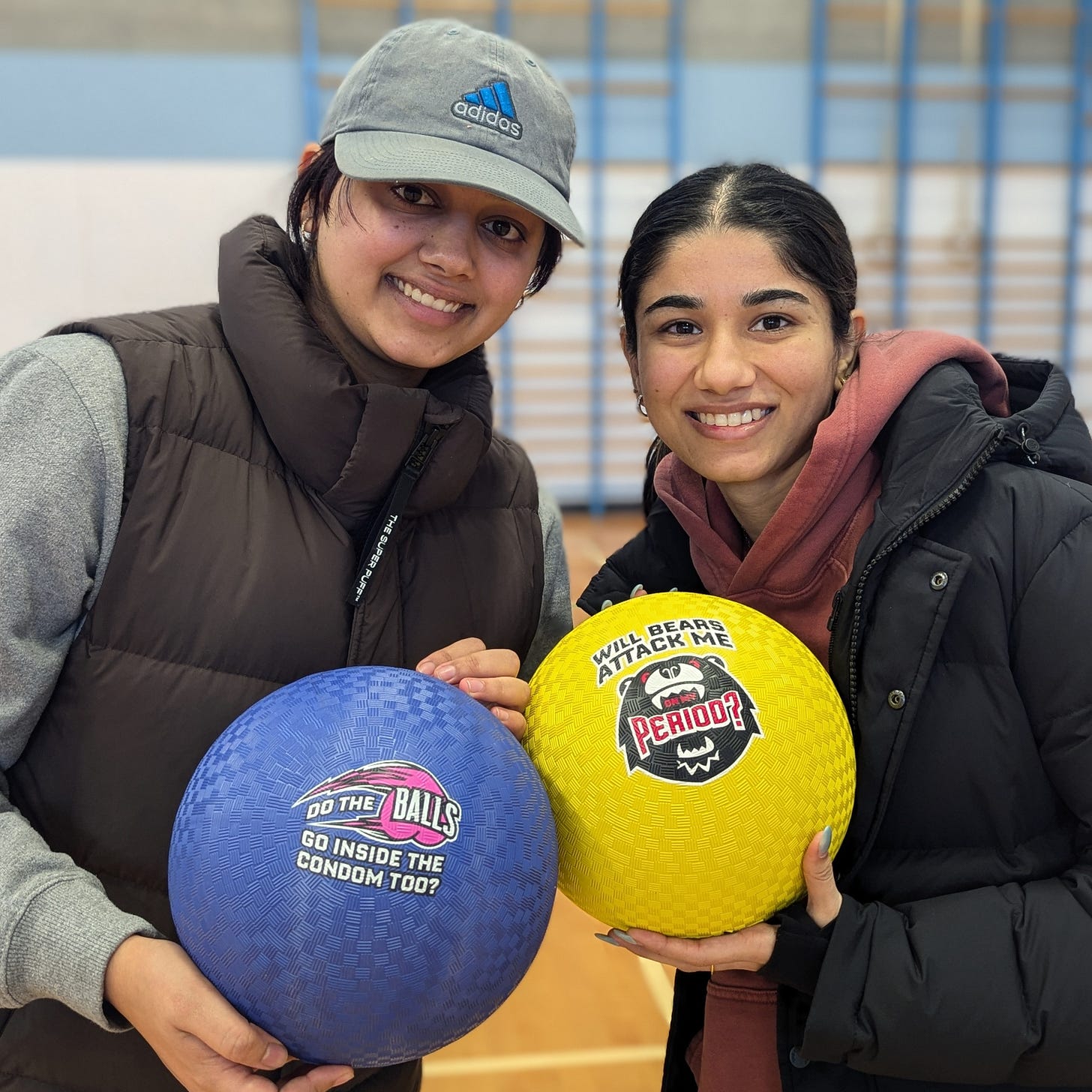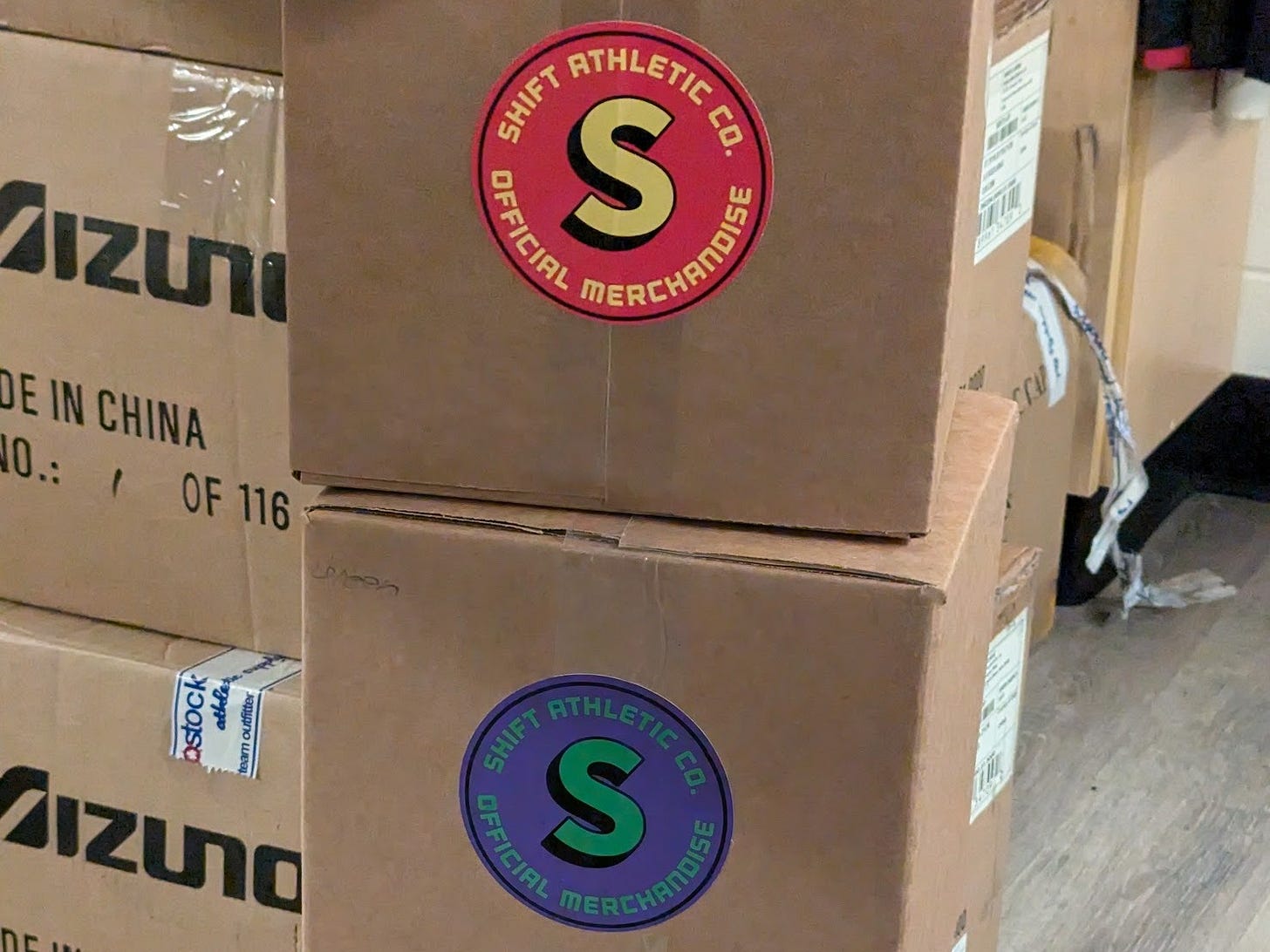A Ballsy, Hilarious Push For Better Sex Ed
Teaching about puberty and sexuality is so awkward that many teachers avoid it altogether. Shift Education is trying to change things with a campaign that teachers can't dodge.
Hi readers! We invited Jessy Wollen, the founder of Shift Education, to tell us about the organization’s wild new campaign. Jessy’s an educator who’s known for her sense of humor and ability to stimulate much-needed conversations about science, sexual health, and healthy relationships.
Before we get to the interview, you need to watch this video:
Shift Education’s Jessy Wollen
Key takeaways:
To advocate for better sex ed, put the needs of the students first: Putting real student questions at the center of this campaign sidesteps a lot of “Why do we need to teach this?” concerns.
Humor is a great way to connect: People who can laugh together can learn together. No one wants their sex ed teacher to be nervous and uncomfortable.
People need support and training to teach sex ed well: It can be awkward to stand at the front of classroom and answer questions about penises and vaginas. Adults need real support and practice to do this well!
Hi! Could you do a quick introduction to yourself and your work?
Hi Christopher, I’m Jessica Wollen, founder of SHIFT Education. I’m a teacher fom British Columbia, Canada, and a Certified Sexual Health Educator with 15 years of experience exclusively in the area of sexual health education.
I work with school districts throughout Canada to develop and deliver sexual health and abuse prevention curriculum. This work has taken me to large conferences, classrooms, and small Indigenous communities. I’m passionate about young people having healthy relationships, so I’ve developed workshops and lessons that include:
The Askable Adult Workshop for Parents, Grandparents & other Caregivers to prepare for “The Talks”
The Sex Education Circuit, a Professional Development Training for health teachers + a Grab & Go Sex Education Circuit’ Lesson for Grades 8-10
Healthy Relationships Training Professional Development Training for Educators & Caregivers of Diverse Learners + a 10-unit Healthy Relationships Curriculum
I’m the proud parent of three boys who keep me on my toes and in constant dialogue about ‘all things sexual health’! My husband Brian Dean Williams is a therapist who works closely with men on healthy forms of masculinity.
How did you come up with the idea for this campaign?
This work feels like an uphill battle sometimes and it can be tough to get the message out, especially with everything going on socially and politically right now. It can be discouraging at times. Brian often notices that my mind is kind of wild and creative.
So to be honest, one day in a super helpful and impulsive ADHD moment, I reached out to an old friend who works in advertising. We’d worked together many years ago on an anti-sex trafficking campaign. He thought the Circuit was a great idea and connected me with a local ad agency called Taxi (part of VML Vancouver).
We hit it off right away and this young, creative crew agreed that humor is one of the best ways to open up this tricky conversation. A lot of people describe my workshops as having a stand-up comedy feel, so the synergy was there, and next thing you know we are mailing out dodgeballs with kids’ anonymous sex ed questions on them!
So did you actually ship kickballs out to people? What has the response been like?
Yes! They are out there. We have mailed them and only one got sent back! Success!
We are finding when we deliver them in person that people are surprised and joyful and there is a lot of laughter.
People are starting to follow us online.
I just presented the circuit yesterday to student teachers at the University of British Columbia, and they were super excited and engaged with it. It got them thinking about student-centered learning through games and play.
What do people find if they go to the link on the kickball?
They are taken to the shop where they can follow three steps to get the Circuit into their community.
The idea of teaching sex ed in a “circuit” - like a fitness circuit in a gym - seems like an ideal match for P.E. teachers. How does it work? What do you like about it?
In 2016 where we live in British Columbia, the government moved the responsibility for sexual health education from counsellors to P.E. teachers. This made sense on one level, but on the other hand, many P.E. teachers seemed uncomfortable delivering the information in the traditional format of speaking from the front of the room. Some (not all) were pretty embedded in “bro culture” and had a hard time feeling at ease with this material.
I wanted to fix that problem and came up with the idea of station-based learning that is more peer-based and interactive, while staying rooted in science and the facts. Our sons were in a Montessori school for awhile, and seeing that teaching style of not having desks in rows, using interactive stations, and teaching students how to learn inspired me as well.
The Sexual Health Circuit (aka The Circuit) is a station-based learning kit for delivering sexual health education. Students move between stations that include a condom demo, menstruation, literature review, values exercise, anatomy, safer sex, how to seek support, and puberty. This is the base kit and the “expansion” will include other elements like an STD dodgeball game!
Students have immediately picked this up with enthusiasm and it has grown from there. Teachers love it and come up to me often saying “hey, I can do this!”
More ease for teachers, more engaging for students = improved health outcomes for communities.
One thing I love about this campaign is that it is so funny. How much do you use humor in your work with youth?
All.
The.
Time.
It’s my thing.
Get people laughing and they feel so much more at ease with a potentially awkward and charged topic.
In order to cope with the overwhelm of rape culture and the patriarchy, Brian and I spend hours watching standup and consider ourselves connoisseurs of the genre! I’ve been the MC at weddings and Brian is pushing me to get on the mic at open mic nights in the clubs!

What is your message to a P.E. teacher who feels intimidated or worried about teaching sex ed?
It’s not our fault that most of us didn’t get comprehensive health education.
We all deserve the opportunity to learn about our bodies and how they work.
We all want to be better friends, partners, and family members.
You don’t need to have the expertise on the content, you already know how to hold space for students to learn, make mistakes, and grow from them. And for P.E. teachers, you already know how to run circuit training! This is another form of that. You just have to call rotation and encourage the students to stay engaged.
How do you help people get more comfortable teaching about topics like puberty and consent?
Mostly through dick jokes. Just kidding!
Mostly through practice.
Seeing the evidence that it works and watching the students have fun with it.
Using humor and normalizing discomfort.
Vikki Reynolds, a local activist and counsellor, taught me a long time ago the difference between uncomfortable and unsafe, and not to mix these up. Being uncomfortable can be helpful for our growth and worth leaning into sometimes. This program helps students and teachers to recognize what is actually unsafe and how to deal with it effectively.
Why is talking about these topics so important to you?
Growing up, most of my female friends were sexually assaulted at some point. I was fortunate to have a safe and loving family, but not everyone is. We didn’t learn strategies or lessons on healthy relationships at school or how to be safe in intimate relationships. The message was “don’t wear that” or “stay in groups,” not “hey, don’t rape,” or “if you feel like your friend is acting like a slobbering creep, help him get home safely, and tuck him into bed.”
I wanted a clear, accessible, and proactive solution that extends to people of all genders. An easy way for teachers to deliver a tricky topic, so more young people learn body knowledge, advocacy, and the skills to connect.
In Canada, Indigenous Women and Girls are deeply impacted by violence, more than any other community, and enough is enough. When all young people, as outlined in the Convention on the Rights of the Child, have access to comprehensive sexual health, we all have a better chance for respectful interaction, safer behaviors, less violence, and more joy and pleasure.
How can people find out more about your work?
Instagram: https://www.instagram.com/shifteducation/
Bonus: Catch Up With Jessy’s Podcast Appearances
Reframing the Sex Talk: Let’s Talk about Teaching Sexual Health Education
Apple Podcasts Version:Spotify Version:
West Coast Conversations: Genevieve Woods
My Preteen Has Developmental Disabilities. How Can I Talk To Them About Sexual Health?
“In these episodes, Saleema talks to Jessica Wollen, a sexual health educator specializing in teaching kids (and their adults) with disabilities. They talk about how we can convey positive messages about sexuality and relationships to neurodiverse learners and answer the questions that are top of parents’ minds: Do I need to teach my child the same things a “typical” child learns? How can I break down the information in a way they understand? What if puberty isn’t on their radar yet, should I still talk about it? How can I support them to foster healthy relationships growing up? And what about keeping them safe online when I’m not there with them? There’s so much juicy goodness in this interview we had to divide it into two parts...tune in to soak it all up!”
Part 1:
Part 2:
Have a podcast? Contact Jessy for an informative, engaging and funny podcast guest!
Recent Teen Health Today Highlights
Want To Dramatically Improve Teens' Lives? Do These Three Things.
This program is called "What Works In Schools" because it REALLY works
The Murder Of A Trans Teen Changed My Teaching Forever
We have to talk about gender identity in schools. Here's why.VIDEO: Social Media And Teens — Advice From Lisa Damour And Christopher Pepper
In a discussion hosted by Common Sense Media, we talk about the many ways social media intersects with growing up todayDrinking Causes Cancer. How Should We Talk To Teens About This?
The Surgeon General wants everyone to know how much alcohol use increases cancer risk. Here are my suggestions about how to explain this to young people.
If you enjoyed this post, please consider forwarding it to someone who might like it, and click the ❤️ or 🔁 button so more people can discover it on Substack. Thanks! 🙏







